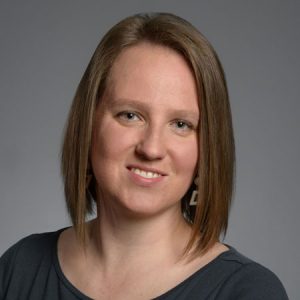Published on
Updated on

For Rachel Proffitt, OTD, OTR/L it’s been rewarding to research her family history and where they come from.
According to the American Immigration Council, nearly a quarter of New York residents are immigrants.
“I’m one of those typical New York families where you can go back maybe one or two generations and then it’s immigrants coming here in the 1800s or so,” said Proffitt.
Through that exploration she discovered something very important about her genealogy.
“My mother’s side she grew up in Kansas City and that’s where the hearing loss gene comes from,” she said. “My mother, a couple of her siblings, my cousin and I have bilateral sensorineural hearing loss.”
Having this disability has taught Proffitt not only about problem solving but inspires her to help others.
“There isn’t always just one way to tackle a problem. I know how technology can benefit people and help them be as functional as they can be.”
Research that matters
Proffitt is an associate professor in the Department of Occupational Therapy within the College of Health Sciences. She spends most of her time exploring novel technologies for post stroke and post traumatic brain injury rehabilitation within older adults.
Proffit’s interest in this topic was piqued while completing her clinical training at Washington University in St. Louis.
“A woman from computer science came into the lab one day when I happened to be working,” Proffitt said. “She said she would love to use games they built for an actual purpose. I spun around in my chair, and I asked if I could do this for my doctoral research.”
Since that encounter in the lab, Proffitt has gone from the developmental stage to testing these technologies in real life. Her work analyzes using fun technologies such as games, to measure how well someone uses their body in everyday life.
“After having a stroke, some people may not be able to use their arms as well and reach up to that high cabinet. We use these technologies to either help them reach up to that shelf or we need to figure out that they’re only able to reach up to a certain height and we move things around in their kitchen.
A benefit to society
Proffitt believes in what technology can do for society.
“Technology isn’t going anywhere,” she said. “How do we in the healthcare field capitalize on this and use it for the greater good?”
She believes that technology can help clinicians become more efficient in the way care is delivered as well as make healthcare more personalized to the individual she serves.
“Being able to do remote assessments and telehealth with people opens the scope of who we can and where we can work with people that need care, especially here in Missouri.
Proffitt’s current research study focuses on rural Missouri and expanding novel technologies into those communities.
“If we could use things like what I’m doing to help supplement where insurance doesn’t pick up, that would be fabulous.”
Proffitt appreciates her network at Mizzou and finds commonalities in how to problem solve.
“Being able to work with colleagues from other disciplines and departments has been a lot of fun. What I have found is we have similar approaches to problem-solving and ultimately, we share the desire to tackle the challenges facing the healthcare industry and society.”